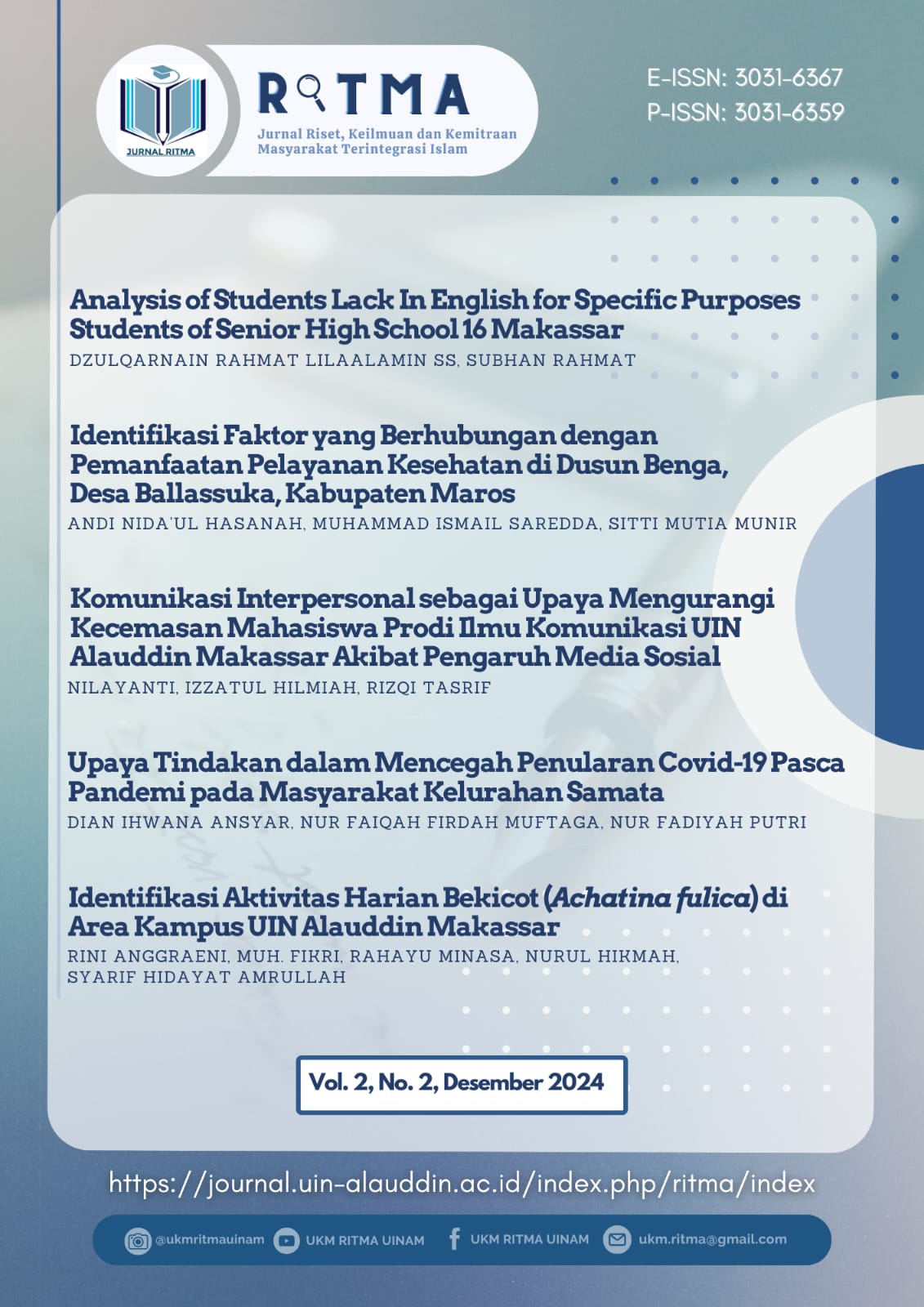Analyzing of Students Lack in English for Specific Purposes Students of Senior High School 16 Makassar
Abstract
This study aims to provide information about the lack or obstacles in the teaching and learning of students of SMAN 16 Makassar towards English. Therefore, a lack analysis is needed to find out what are the obstacles to students in teaching and learning English. This research was conducted to collect information about the problems of English in order to analyse what are the obstacles or lack experienced by students in English language learning. In this study, researchers used quantitative methods with a questionnaire through Google form as a research instrument. The respondents of this study were the students of SMAN 16 Makassar with a total of 54 students who were divided into 2 groups, which were class X-j totaling 24 students, and class XI IPS 4 totaling 30 students. The results found after conducting this research are that, the students of SMAN 16 Makassar experience several obstacles and shortcomings during English learning, such as embarrassing or nervous in implementing dialog to their friends, they also experience a lack of practice in speaking skills in English, and so on.
References
Akopova, A. S. (2023). English for Specific Purposes: Tailoring English language instruction for history majors. Training, Language and Culture, 7(3), 31-40.
Afifah, N. (2024). An analysis of the factors and the types of speaking difficulties for Islamic senior high school students: A descriptive qualitative analysis research at the eleventh-grade students of Jakarta
Bayram, İ., & Canaran, Ö. (2020). Identifying the perceived professional development needs of English for specific purposes (ESP) teachers. Ilkogretim Online, 19(3).
Bohari, L. (2020). Improving Speaking Skills Through Small Group Discussion At Eleventh Grade Students of Sma Plus Munirul Arifin Nw Praya. Journal of Languages and Language Teaching, 7(1), 68. https://doi.org/10.33394/jollt.v7i1.1441
Dudley-Evans, T. (1998). An Overview of ESP in the 1990s.
Fitria, T. N. (2020). Teaching English for Specific Purposes (ESP) to the Students in English Language Teaching (ELT). Journal of English Teaching Adi Buana, 5(01).
Hutchinson, T., & Waters, A. (1987). English for specific purposes. Cambridge university press.
Hidayati, W. (2019). An Analysis of Difficulty Level in Speaking English By Eighth Class Students Of Smp Unismuh Makassar. University of Muhammadiyah Makassar.
Pranoto, B. E., & Suprayogi, S. (2020). A need analysis of ESP for physical education students in Indonesia. Premise: Journal of English Education, 9(1), 94-110.
Rasika, A. T. U. L., & Sharma, V. I. J. A. Y. (2019). English language use in tourism industry. International Journal of Applied Social Science, 6(2), 439-444.
Richards, J. C. (2010). Competence and performance in language teaching. RELC journal, 41(2), 101-122.
Samira, A. H. (2014). Speaking Difficulties Encountered by Young EFL Learners. English Language Teaching, 2(6), 22–30
Suari, W. (2021). An Analysis of Students’ Difficulties In Speaking English At Tenth Grade Of Sma Swasta Nurul Iman Tanjung Morawa. State Islamic University of North Sumatera
Tauchid, A., Saleh, M., Hartono, R., & Mujiyanto, J. (2022). English as an international language (EIL) views in Indonesia and Japan: A survey research. Heliyon, 8(10).
Tien, H. H. (2021). Integrating project-based learning Into English for specific purposes classes at tertiary level: Perceived challenges and benefits. VNU Journal of Foreign Studies, 37(4), 128-148.
Tinh, D. T., Thuy, N. T., & Ngoc Huy, D. T. (2021). Doing Business Research and Teaching Methodology for Undergraduate, Postgraduate and Doctoral Students-Case in Various Markets Including Vietnam. Ilkogretim Online, 20(1).

